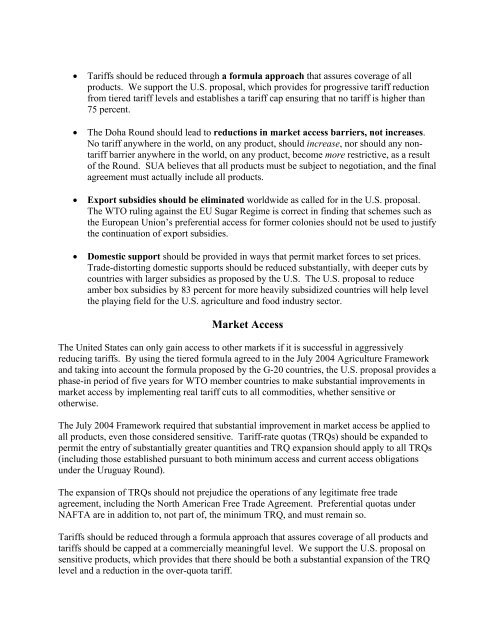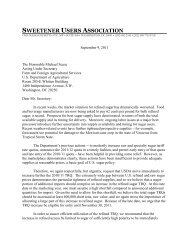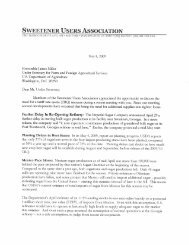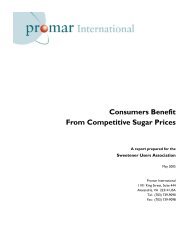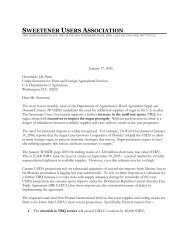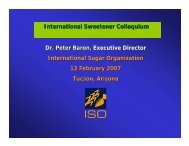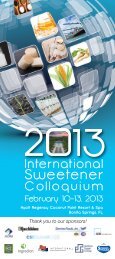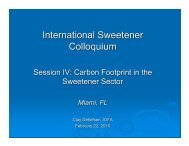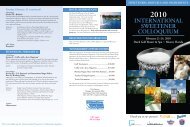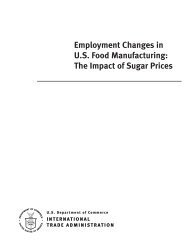Comments to the Trade Policy Staff Committee - Sweetener Users ...
Comments to the Trade Policy Staff Committee - Sweetener Users ...
Comments to the Trade Policy Staff Committee - Sweetener Users ...
You also want an ePaper? Increase the reach of your titles
YUMPU automatically turns print PDFs into web optimized ePapers that Google loves.
• Tariffs should be reduced through a formula approach that assures coverage of all<br />
products. We support <strong>the</strong> U.S. proposal, which provides for progressive tariff reduction<br />
from tiered tariff levels and establishes a tariff cap ensuring that no tariff is higher than<br />
75 percent.<br />
• The Doha Round should lead <strong>to</strong> reductions in market access barriers, not increases.<br />
No tariff anywhere in <strong>the</strong> world, on any product, should increase, nor should any nontariff<br />
barrier anywhere in <strong>the</strong> world, on any product, become more restrictive, as a result<br />
of <strong>the</strong> Round. SUA believes that all products must be subject <strong>to</strong> negotiation, and <strong>the</strong> final<br />
agreement must actually include all products.<br />
• Export subsidies should be eliminated worldwide as called for in <strong>the</strong> U.S. proposal.<br />
The WTO ruling against <strong>the</strong> EU Sugar Regime is correct in finding that schemes such as<br />
<strong>the</strong> European Union’s preferential access for former colonies should not be used <strong>to</strong> justify<br />
<strong>the</strong> continuation of export subsidies.<br />
• Domestic support should be provided in ways that permit market forces <strong>to</strong> set prices.<br />
<strong>Trade</strong>-dis<strong>to</strong>rting domestic supports should be reduced substantially, with deeper cuts by<br />
countries with larger subsidies as proposed by <strong>the</strong> U.S. The U.S. proposal <strong>to</strong> reduce<br />
amber box subsidies by 83 percent for more heavily subsidized countries will help level<br />
<strong>the</strong> playing field for <strong>the</strong> U.S. agriculture and food industry sec<strong>to</strong>r.<br />
Market Access<br />
The United States can only gain access <strong>to</strong> o<strong>the</strong>r markets if it is successful in aggressively<br />
reducing tariffs. By using <strong>the</strong> tiered formula agreed <strong>to</strong> in <strong>the</strong> July 2004 Agriculture Framework<br />
and taking in<strong>to</strong> account <strong>the</strong> formula proposed by <strong>the</strong> G-20 countries, <strong>the</strong> U.S. proposal provides a<br />
phase-in period of five years for WTO member countries <strong>to</strong> make substantial improvements in<br />
market access by implementing real tariff cuts <strong>to</strong> all commodities, whe<strong>the</strong>r sensitive or<br />
o<strong>the</strong>rwise.<br />
The July 2004 Framework required that substantial improvement in market access be applied <strong>to</strong><br />
all products, even those considered sensitive. Tariff-rate quotas (TRQs) should be expanded <strong>to</strong><br />
permit <strong>the</strong> entry of substantially greater quantities and TRQ expansion should apply <strong>to</strong> all TRQs<br />
(including those established pursuant <strong>to</strong> both minimum access and current access obligations<br />
under <strong>the</strong> Uruguay Round).<br />
The expansion of TRQs should not prejudice <strong>the</strong> operations of any legitimate free trade<br />
agreement, including <strong>the</strong> North American Free <strong>Trade</strong> Agreement. Preferential quotas under<br />
NAFTA are in addition <strong>to</strong>, not part of, <strong>the</strong> minimum TRQ, and must remain so.<br />
Tariffs should be reduced through a formula approach that assures coverage of all products and<br />
tariffs should be capped at a commercially meaningful level. We support <strong>the</strong> U.S. proposal on<br />
sensitive products, which provides that <strong>the</strong>re should be both a substantial expansion of <strong>the</strong> TRQ<br />
level and a reduction in <strong>the</strong> over-quota tariff.


